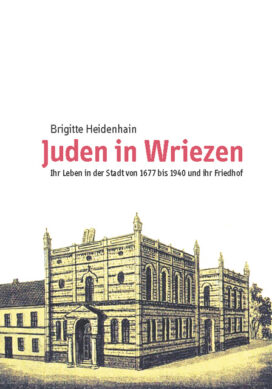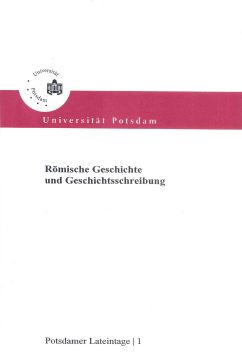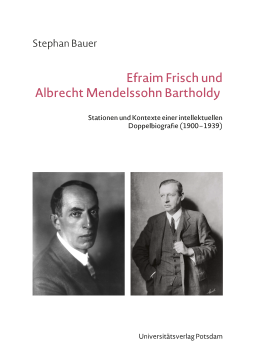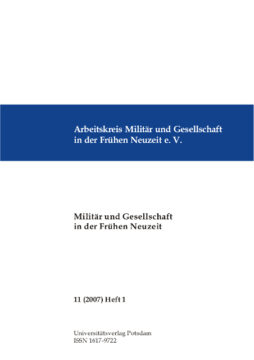The history of jews in Wriezen begins in 1677, shortly after Kurfürst Friedrich Wilhelm allowed jews to settle in Brandenburg again through his edict of 1671. However, during the whole of the 18th century Prussian policy toward jews was extremely restrictive . The results of this policy are clearly visible in the life of the jews of Wriezen: they always remained a small congregation since this was the will of the king for small towns. Life was dominated by the struggle for the right of residence. Status as “Schutzjude” (i.e. “Protected Jew”) was restricted to few individuals, leading to the separation of families as younger siblings were forced to leave. State regulated economic policy strongly restricted the freedom of trade, the main source of income for the jews, leading to the impoverishment of most jewish families in Wriezen. In the 18th century, there was no organized congregational activity. This only developed in the course of the 19th century. The jews of Wriezen built their first synagogue in 1820, replacing it with a new and larger one in 1886. The emancipation edict of 1812 improved the general situation of individuals and the new freedom of movement led to an influx of jews to Wriezen. But full legal equality with other citizens was not achieved until the German Empire was founded in 1871. In the first half of the 19th century, the economic situation of the jews of Wriezen was still quite modest, only improving toward the end of the century. There were numerous fluctuations in the membership of the jewish community in the last decades of the 19th and the beginning of the 20th century. But the number of jewish inhabitants of Wriezen remained relatively constant at 100 -120 individuals. There is hardly any written information on the sudden and complete end of jewish life in Wriezen after 1938. At least 59 jewish citizens of Wriezen were deported and murdered between 1940 and 1945. The victims are commemorated in the public database of the Yad-VaShem Memorial in Jerusalem. There has been a jewish cemetery in Wriezen since 1730, in which 131 gravestones still survive today. The oldest dates back to 1773, the last is from 1940.
Ihr Leben in der Stadt von 1677 bis 1940 und ihr Friedhof
ISBN: 978-3-939469-39-1
184 pages
Release year 2007
Series: Pri ha-Pardes , 1
12,00 €
Non-taxable transaction according to § 1 (1) UStG/VAT Act in combination with § 2 (3) UStG/VAT Act a. F. Providing this service, the University of Potsdam does not constitute a Betrieb gewerblicher Art/Commercial Institution according to § 1 (1) No. 6 or § 4 KStG/Corporate Tax Act. If the legal characterization of our business is changed to a commercial institution subsequently, we reserve the right to invoice VAT additionally. zzgl. Versandkosten
The history of jews in Wriezen begins in 1677, shortly after Kurfürst Friedrich Wilhelm allowed jews to settle in Brandenburg again through his edict of 1671. However, during the whole of the 18th century Prussian policy toward jews was extremely restrictive . The results of this policy are clearly visible in the life of the jews of Wriezen: they always remained a small congregation since this was the will of the king for small towns. Life was dominated by the struggle for the right of residence. Status as “Schutzjude” (i.e. “Protected Jew”) was restricted to few individuals, leading to the separation of families as younger siblings were forced to leave. State regulated economic policy strongly restricted the freedom of trade, the main source of income for the jews, leading to the impoverishment of most jewish families in Wriezen. In the 18th century, there was no organized congregational activity. This only developed in the course of the 19th century. The jews of Wriezen built their first synagogue in 1820, replacing it with a new and larger one in 1886. The emancipation edict of 1812 improved the general situation of individuals and the new freedom of movement led to an influx of jews to Wriezen. But full legal equality with other citizens was not achieved until the German Empire was founded in 1871. In the first half of the 19th century, the economic situation of the jews of Wriezen was still quite modest, only improving toward the end of the century. There were numerous fluctuations in the membership of the jewish community in the last decades of the 19th and the beginning of the 20th century. But the number of jewish inhabitants of Wriezen remained relatively constant at 100 -120 individuals. There is hardly any written information on the sudden and complete end of jewish life in Wriezen after 1938. At least 59 jewish citizens of Wriezen were deported and murdered between 1940 and 1945. The victims are commemorated in the public database of the Yad-VaShem Memorial in Jerusalem. There has been a jewish cemetery in Wriezen since 1730, in which 131 gravestones still survive today. The oldest dates back to 1773, the last is from 1940.
Recommended Books
-
 2005
2005Römische Geschichte und Geschichtsschreibung
5,00 €Non-taxable transaction according to § 1 (1) UStG/VAT Act in combination with § 2 (3) UStG/VAT Act a. F. Providing this service, the University of Potsdam does not constitute a Betrieb gewerblicher Art/Commercial Institution according to § 1 (1) No. 6 or § 4 KStG/Corporate Tax Act. If the legal characterization of our business is changed to a commercial institution subsequently, we reserve the right to invoice VAT additionally.
zzgl. Versandkosten
Add to cart -
 2024
2024Efraim Frisch und Albrecht Mendelssohn Bartholdy
47,00 €Non-taxable transaction according to § 1 (1) UStG/VAT Act in combination with § 2 (3) UStG/VAT Act a. F. Providing this service, the University of Potsdam does not constitute a Betrieb gewerblicher Art/Commercial Institution according to § 1 (1) No. 6 or § 4 KStG/Corporate Tax Act. If the legal characterization of our business is changed to a commercial institution subsequently, we reserve the right to invoice VAT additionally.
zzgl. Versandkosten
Add to cart -
 2010
2010Die Prediger der Grafschaft Mansfeld
39,90 €Non-taxable transaction according to § 1 (1) UStG/VAT Act in combination with § 2 (3) UStG/VAT Act a. F. Providing this service, the University of Potsdam does not constitute a Betrieb gewerblicher Art/Commercial Institution according to § 1 (1) No. 6 or § 4 KStG/Corporate Tax Act. If the legal characterization of our business is changed to a commercial institution subsequently, we reserve the right to invoice VAT additionally.
zzgl. Versandkosten
Add to cart -
 2007
2007Arbeitskreis Militär und Gesellschaft in der Frühen Neuzeit e.V.
Militär und Gesellschaft in der Frühen Neuzeit ; 11 (2007) 1
7,50 €Non-taxable transaction according to § 1 (1) UStG/VAT Act in combination with § 2 (3) UStG/VAT Act a. F. Providing this service, the University of Potsdam does not constitute a Betrieb gewerblicher Art/Commercial Institution according to § 1 (1) No. 6 or § 4 KStG/Corporate Tax Act. If the legal characterization of our business is changed to a commercial institution subsequently, we reserve the right to invoice VAT additionally.
zzgl. Versandkosten
Add to cart
Contact
Potsdam University Library
University Press
Am Neuen Palais 10
14476 Potsdam
Germany
verlag@uni-potsdam.de
0331 977-2094
0331 977-2292





